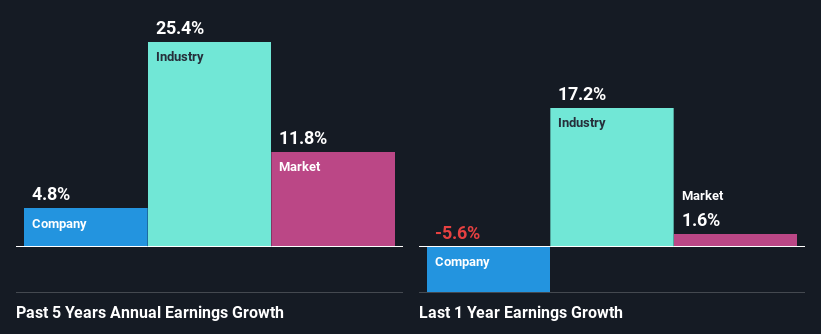Johnson Service Group PLC's (LON:JSG) Financials Are Too Obscure To Link With Current Share Price Momentum: What's In Store For the Stock?
Most readers would already be aware that Johnson Service Group's (LON:JSG) stock increased significantly by 24% over the past three months. However, we wonder if the company's inconsistent financials would have any adverse impact on the current share price momentum. In this article, we decided to focus on Johnson Service Group's ROE.
Return on Equity or ROE is a test of how effectively a company is growing its value and managing investors’ money. In simpler terms, it measures the profitability of a company in relation to shareholder's equity.
View our latest analysis for Johnson Service Group
How To Calculate Return On Equity?
ROE can be calculated by using the formula:
Return on Equity = Net Profit (from continuing operations) ÷ Shareholders' Equity
So, based on the above formula, the ROE for Johnson Service Group is:
9.7% = UK£27m ÷ UK£279m (Based on the trailing twelve months to December 2023).
The 'return' refers to a company's earnings over the last year. That means that for every £1 worth of shareholders' equity, the company generated £0.10 in profit.
What Is The Relationship Between ROE And Earnings Growth?
Thus far, we have learned that ROE measures how efficiently a company is generating its profits. We now need to evaluate how much profit the company reinvests or "retains" for future growth which then gives us an idea about the growth potential of the company. Assuming everything else remains unchanged, the higher the ROE and profit retention, the higher the growth rate of a company compared to companies that don't necessarily bear these characteristics.
Johnson Service Group's Earnings Growth And 9.7% ROE
When you first look at it, Johnson Service Group's ROE doesn't look that attractive. Next, when compared to the average industry ROE of 14%, the company's ROE leaves us feeling even less enthusiastic. As a result, Johnson Service Group reported a very low income growth of 4.8% over the past five years.
We then compared Johnson Service Group's net income growth with the industry and found that the company's growth figure is lower than the average industry growth rate of 25% in the same 5-year period, which is a bit concerning.
Earnings growth is an important metric to consider when valuing a stock. The investor should try to establish if the expected growth or decline in earnings, whichever the case may be, is priced in. This then helps them determine if the stock is placed for a bright or bleak future. Is JSG fairly valued? This infographic on the company's intrinsic value has everything you need to know.
Is Johnson Service Group Using Its Retained Earnings Effectively?
Despite having a moderate three-year median payout ratio of 33% (implying that the company retains the remaining 67% of its income), Johnson Service Group's earnings growth was quite low. So there might be other factors at play here which could potentially be hampering growth. For example, the business has faced some headwinds.
In addition, Johnson Service Group has been paying dividends over a period of at least ten years suggesting that keeping up dividend payments is way more important to the management even if it comes at the cost of business growth. Upon studying the latest analysts' consensus data, we found that the company is expected to keep paying out approximately 38% of its profits over the next three years. Regardless, the future ROE for Johnson Service Group is predicted to rise to 15% despite there being not much change expected in its payout ratio.
Summary
In total, we're a bit ambivalent about Johnson Service Group's performance. While the company does have a high rate of reinvestment, the low ROE means that all that reinvestment is not reaping any benefit to its investors, and moreover, its having a negative impact on the earnings growth. That being so, the latest analyst forecasts show that the company will continue to see an expansion in its earnings. To know more about the company's future earnings growth forecasts take a look at this free report on analyst forecasts for the company to find out more.
Have feedback on this article? Concerned about the content? Get in touch with us directly. Alternatively, email editorial-team (at) simplywallst.com.
This article by Simply Wall St is general in nature. We provide commentary based on historical data and analyst forecasts only using an unbiased methodology and our articles are not intended to be financial advice. It does not constitute a recommendation to buy or sell any stock, and does not take account of your objectives, or your financial situation. We aim to bring you long-term focused analysis driven by fundamental data. Note that our analysis may not factor in the latest price-sensitive company announcements or qualitative material. Simply Wall St has no position in any stocks mentioned.
Have feedback on this article? Concerned about the content? Get in touch with us directly. Alternatively, email editorial-team@simplywallst.com

 Yahoo Finance
Yahoo Finance 
